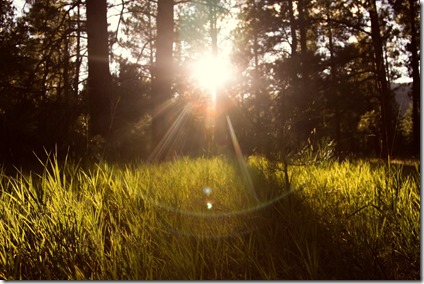 As I look out the window in my office I see that little creek that forms on our parking lot during rain storms and impedes my ability to get to my vehicle without wet shoes. The sky is an indiscriminate gray that advertises a great day for a nap. The sun is shining just as bright as it was yesterday.
As I look out the window in my office I see that little creek that forms on our parking lot during rain storms and impedes my ability to get to my vehicle without wet shoes. The sky is an indiscriminate gray that advertises a great day for a nap. The sun is shining just as bright as it was yesterday.
I forgot something in my car last night. It was cold and dark outside. For some reason when you open the door to the Trailblazer the interior lights won’t turn on unless the vehicle is started. I couldn’t readily find the keys, but had the flashlight on my cell phone handy. It was dark. I didn’t have enough light to get what I had dropped on the floorboard. The sun was shining just as bright as it had been at noon.
The sun shines just as bright at midnight as it does at noon. The problem is that either clouds or the position of our earth is blocking it’s light. It doesn’t stop shining. Our experience of it’s rays change. It doesn’t. (Okay science nerds—I know it does change some, but bear with me).
“This is the message we have heard from him and proclaim to you, that God is light, and in him is no darkness at all.” –1 John 1:5
John sums up Jesus’ message about the Father by saying that “He is light”. Of course, this isn’t all there is to be said about the Father. Nor is this even him saying “He is light” is the pre-eminent attribute. But this is set against the backdrop of the Gnostic heretics. They viewed God as being shadowy, secret, hiding himself to all except for the elite.
To this John says that God is light. There is no darkness in him. No not none at all. (I know that’s not quality grammar, but that’s how John says it for emphasis). Not one speck of darkness. He is always shining.
When the Bible speaks of “light” it’s typically a reference to either moral purity or knowledge/revelation. Here it’s probably both because John will later speak of “walking in the light” in the context of living in purity, but it’s also in the context of Gnosticism. God is both morally pure—not even a speck of sin—and absolutely no hiding in the shadows.
I appreciate how John Stott explains this:
It is his nature to reveal himself, as it is the property of light to shine; and the revelation is of perfect purity and unutterable majesty…
The miserable errors of the heretics were due to their ignorance of God’s ethical self-revelation as light. They could never have laid claim to a private, esoteric gnōsis into which they had been initiated if their conception of God had been of one who is light, diffusive, shining forth and manifesting himself, in whom there is no darkness at all, no secrecy, no hiding in the shadows. (Stott, 75)
God delights to reveal himself. That’s part of what it means that He is light. This is incredibly good news for those of us who were raised on a theology which seemed to teach that God was always hiding behind bushes and in signs and cryptic messages. He isn’t hiding from you. He isn’t punishing you until you figure out his tough lessons. He is always shining.
The issue is that we don’t see so well, just as on a cloudy day when we cannot see the bright sun because of the clouds. This is why the Psalmist prays, “Open my eyes that I may see wonderful things in your law.” Or that God says, “let there be light” so that we can see the “knowledge of the glory of Christ”.
When we think about God teaching us those painful lessons of providence, it’s not meant to chastise us for our ignorance (see James 1). Suffering has a way of giving us His eyes. Scales are removed in the furnace of suffering. Our prayer really shouldn’t be, “show me, Lord” as much as it is, “open my eyes”.
God is light.
No darkness.
God isn’t playing hide and seek with you. He’s not a God of secret knowledge. He is a sun always shining. We are dependent upon His revelation and He happily gives it. May our eyes be opened to seeing Him.
The sun shines even at midnight. God is shining even when we cannot see. In moments of darkness we do well to trust what we saw in the light.
—
Photo source: here